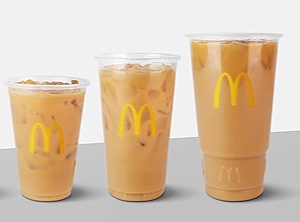MCDONALD'S
Trial to test clear plastic cups sourced from sustainable materials
 McDonald's also uses its own cooking oil in the production of these cups (Photo: McDonald's) |
US fast-food giant McDonald’s (San Bernardino, California; www.mcdonalds.com) is testing clear plastic cups sourced from recycled and bio-based materials, as part of the company’s steps towards using sustainable materials for 100% of its guest packaging by 2025.
The trial is organised by TMS-HAVI, in partnership with Pactiv Evergreen (Auckland, New Zealand; www.pactivevergreen.com), Neste (Espoo, Finland; www.neste.com), Ineos (London, UK; www.ineos.com), and LyondellBasell (LBY, Houston, Texas; www.lyondellbasell.com).
The cups are sourced from a 50-50 mix of post-consumer plastic material and bio-based materials, including those partly originating from McDonald’s used cooking oil. The test uses a mass-balance approach – a process that allows the company to measure and track recycled and bio-based inputs being used, because the production process also sees a mix of traditional fossil-fuel sources.
Related: Fast-food giants hop on sustainability bandwagon / McDonald's to replace Happy Meal toys
The cups are now available in 28 select restaurants in the city of Savanah, Georgia, USA. They are nearly identical to the old McDonalds’s cups customers are used to. The fast-food giant also plans to increase the accessibility of this material nationwide.
The company added that customers who use the cups are encouraged to rinse and reuse them at home, or dispose of them in a recycling bin.
The trial is organised by TMS-HAVI, in partnership with Pactiv Evergreen (Auckland, New Zealand; www.pactivevergreen.com), Neste (Espoo, Finland; www.neste.com), Ineos (London, UK; www.ineos.com), and LyondellBasell (LBY, Houston, Texas; www.lyondellbasell.com).
The cups are sourced from a 50-50 mix of post-consumer plastic material and bio-based materials, including those partly originating from McDonald’s used cooking oil. The test uses a mass-balance approach – a process that allows the company to measure and track recycled and bio-based inputs being used, because the production process also sees a mix of traditional fossil-fuel sources.
Related: Fast-food giants hop on sustainability bandwagon / McDonald's to replace Happy Meal toys
The cups are now available in 28 select restaurants in the city of Savanah, Georgia, USA. They are nearly identical to the old McDonalds’s cups customers are used to. The fast-food giant also plans to increase the accessibility of this material nationwide.
The company added that customers who use the cups are encouraged to rinse and reuse them at home, or dispose of them in a recycling bin.
02.05.2022 Plasteurope.com [250139-0]
Published on 02.05.2022
